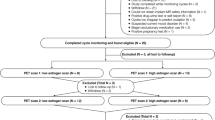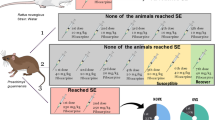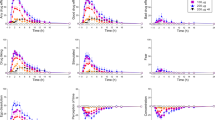Abstract
THE enzyme monoamine oxidase (MAO) (EC 1.4.3.4), which is widely distributed in the animal kingdom, is probably involved in the in vivo inactivation of a number of biologically active monoamines of physiological importance although its precise function has yet to be defined. Its putative role in the pathogenesis of mental disease has tended to focus interest on the brain in recent years, rather to the exclusion of other anatomical sites. J. S. et al.1, however, have lately drawn attention to a variant of this enzyme present in human endometrium which undergoes sharp changes in activity during the different phases of the menstrual cycle. Although there is some evidence to suggest that such cyclical variations do not occur outside the female genital tract in the human2, small fluctuations of enzyme activity have been noted in several rat and guinea-pig tissues during the oestrus cycle3–7. The most likely explanation for all these changes must presumably be based on alterations in hormonal levels, and to investigate this possibility we sought to influence the MAO activity of rat tissues by pretreating the animal with oestradiol and progesterone. Although hormones such as these may mediate the observed changes, the available data do not shed any light on how direct is the cause and effect relationship. There may be intermediate stages in the train of events leading to alterations in enzyme activity. A number of reports8,9 point to variations in tissue concentration of amine substrates of MAO during the phases of the oestrus cycle. It is possible therefore that physiologically occurring cyclical increases in MAO activity might represent an adaptive response to increased availability of substrate. We have attempted to evaluate this possibility indirectly by treating rats before enzyme assay with DOPA which leads to increased tissue levels of the MAO substrate, dopamine.
This is a preview of subscription content, access via your institution
Access options
Subscribe to this journal
Receive 51 print issues and online access
$199.00 per year
only $3.90 per issue
Buy this article
- Purchase on Springer Link
- Instant access to full article PDF
Prices may be subject to local taxes which are calculated during checkout
Similar content being viewed by others
References
Southgate, J., Grant, E. C. G., Pollard, W., Pryse-Davies, J., and Sandler, M., Biochem. Pharmacol., 17, 721 (1968).
Southgate, J., Collins, G. G. S., Pryse-Davies, J., and Sandler, M., J. Clin. Path. Suppl. (Ass. Clin. Path.), 3, 43 (1970).
Salseduc, M. M., Jofre, I. J., and Izquierdo, J. A., Med. Pharmacol. Exp., 14, 113 (1966).
Léonardelli, J., CR Séanc. Soc. Biol., 160, 2072 (1966).
Zolovick, A. J., Pearse, R., Boehlke, K. W., and Eleftheriou, B. E., Science, 154, 649 (1966).
Kobayashi, T., Kobayashi, T., Kato, J., and Minaguchi, H., Endocrinol. Japon., 11, 283 (1964).
Cavanaugh, M. J., and Zeller, E. A., Fed. Proc., 26, 814 (1967).
Rudzik, A. D., and Miller, J. W., J. PharmacoL Exp. Ther., 138, 88 (1962).
Wurtman, R. J., Chu, E. W., and Axelrod, J., Nature, 198, 547 (1963).
Kraml, M., Biochem. Pharmacol., 14, 1684 (1965).
Lowry, O. H., Rosebrough, N. J., Farr, A. L., and Randall, R. J., J. Biol. Chem., 193, 265 (1951).
Glenner, G. C., Burtner, H. J., and Brown, G. W., J. Histochem. Cytochem., 5, 591 (1957).
Werth, G., Arzneimittel-Forsch., 5, 738 (1955).
Grant, E. C., and Pryse-Davies, J., Brit. Med. J., iii, 777 (1968).
Wurtman, R. J., and Axelrod, J., Biochem. Pharmacol., 12, 1417 (1963).
Skillen, R. G., Thienes, C. H., and Strain, L., Endocrinology, 70, 743 (1962).
Thompson, R. H. S., and Tickner, A., Abstr. First Intern. Cong. Biochem., 429 (Cambridge, 1949).
Coveney, J., thesis, Univ. of London (1964).
Pinto, R. M., and Rabow, W., Prensa Med., Argent., 53, 1151 (1966).
Rosell, S., Sedvall, G., and Ullberg, S., Biochem. Pharmacol., 12, 265 (1963).
Weiner, N., Arch. Biochem. Biophys., 91, 182 (1960).
Roth, R. H., and Stjärne, L., Acta Physiol. Scand., 68, 342 (1966).
Youdim, M. B. H., and Sandier, M., Biochem. J., 105, 43P (1967).
Collins, G. G. S., Youdim, M. B. H., and Sandler, M., FEBS Lett., 1, 215 (1968).
Youdim, M. B. H., Collins, G. G. S., and Sandler, M., Nature, 223, 626 (1969).
Author information
Authors and Affiliations
Rights and permissions
About this article
Cite this article
COLLINS, G., PRYSE-DAVIES, J., SANDLER, M. et al. Effect of Pretreatment with Oestradiol, Progesterone and DOPA on Monoamine Oxidase Activity in the Rat. Nature 226, 642–643 (1970). https://doi.org/10.1038/226642a0
Received:
Revised:
Issue Date:
DOI: https://doi.org/10.1038/226642a0
This article is cited by
-
Aberrant CpG Methylation Mediates Abnormal Transcription of MAO-A Induced by Acute and Chronic l-3,4-Dihydroxyphenylalanine Administration in SH-SY5Y Neuronal Cells
Neurotoxicity Research (2017)
-
Modulation of monoamine oxidase (MAO) expression in neuropsychiatric disorders: genetic and environmental factors involved in type A MAO expression
Journal of Neural Transmission (2016)
-
Historical studies of premenstrual tension up to 30 years ago: Implications for future research
Current Psychiatry Reports (2002)
-
Platelet phenolsulphotransferase activity in Parkinson's disease
Journal of Neural Transmission (1983)
-
Monoamine oxidase A deficit in liver of germ-free rats
Experientia (1983)
Comments
By submitting a comment you agree to abide by our Terms and Community Guidelines. If you find something abusive or that does not comply with our terms or guidelines please flag it as inappropriate.



